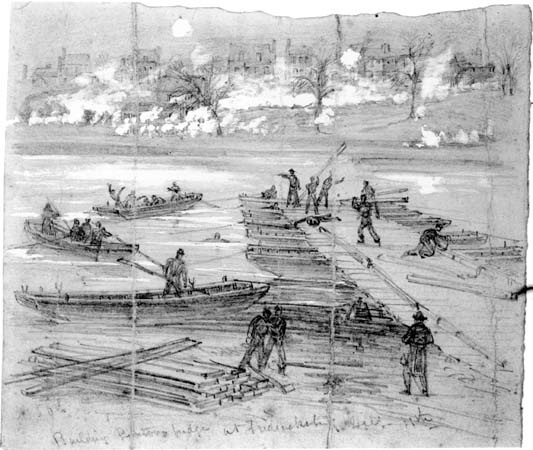Fredericksburg, Battle of
American Civil War 【1862】

 (December 13, 1862), bloody engagement of the American Civil War fought at Fredericksburg, Virginia; its outcome—a crushing Union defeat—immeasurably strengthened the Confederate cause. General A.E. Burnside (Burnside, Ambrose Everett), newly appointed commander of the Northern forces, planned to cross the Rappahannock River with an army of more than 120,000 troops and advance on the Southern capital at Richmond. Confederate General Robert E. Lee (Lee, Robert E.) countered by taking a strong position on high ground behind Fredericksburg with a force of about 78,000. The attack on December 13 proved a complete failure, and Burnside's casualties totaled more than 12,500, compared to only about 5,000 for the carefully entrenched Confederates. General Burnside was relieved of his command the following month and has been severely criticized by historians for his conduct of this battle. Once again the Union had failed in what should have been its main objective—destruction of the Army of Northern Virginia. Richmond seemed as far away as ever. For the South, the victory restored morale lost after Lee's retreat from Maryland following his unsuccessful Antietam campaign in September.
(December 13, 1862), bloody engagement of the American Civil War fought at Fredericksburg, Virginia; its outcome—a crushing Union defeat—immeasurably strengthened the Confederate cause. General A.E. Burnside (Burnside, Ambrose Everett), newly appointed commander of the Northern forces, planned to cross the Rappahannock River with an army of more than 120,000 troops and advance on the Southern capital at Richmond. Confederate General Robert E. Lee (Lee, Robert E.) countered by taking a strong position on high ground behind Fredericksburg with a force of about 78,000. The attack on December 13 proved a complete failure, and Burnside's casualties totaled more than 12,500, compared to only about 5,000 for the carefully entrenched Confederates. General Burnside was relieved of his command the following month and has been severely criticized by historians for his conduct of this battle. Once again the Union had failed in what should have been its main objective—destruction of the Army of Northern Virginia. Richmond seemed as far away as ever. For the South, the victory restored morale lost after Lee's retreat from Maryland following his unsuccessful Antietam campaign in September.- vinylidene chloride
- Vinícius de Morais
- viol
- Viola
- viola
- Viola Allen
- Viola, Bill
- Violence Against Women Office
- Violeta Barrios de Chamorro
- Violette Verdy
- violin
- Violle, Jules
- Viollet-le-Duc, Eugène-Emmanuel
- Viotti, Giovanni Battista
- viper
- viperfish
- Viphya Mountains
- Vipsania Agrippina
- Viracocha
- viral hemorrhagic fever
- Virchow, Rudolf
- Virden
- virelai
- vireo
- Viret, Pierre